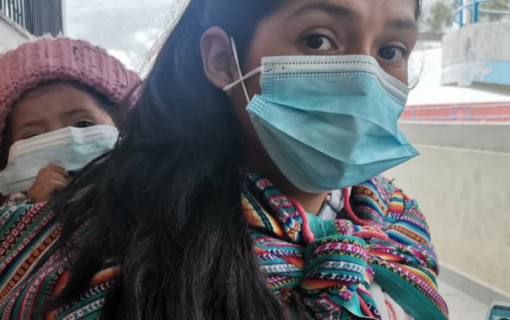
Inclusive Legal Frameworks: Empowering Women Through Rule of Law
On September 22, 2016, the International Foundation for Electoral Systems (IFES) and the Office of Congresswoman Sheila Jackson Lee (TX-18) hosted “Inclusive Legal Frameworks: Empowering Women Through Rule of Law,” the eighth installment of the “Women, Peace and Security” Capitol Hill breakfast briefing series.
Jessica Huber, IFES Senior Gender Specialist, opened the event by providing an overview of the “Women, Peace and Security” series and how the day’s conversation would be framed in the context of United Nations Security Council Resolution (UNSCR) 1325 on Women, Peace and Security and the U.S. Government’s National Action Plan on 1325. She highlighted how IFES uses a gender lens across its programming and publications, including its newest briefing, “Women and Political Transition: The Risk of Replicating Inequality and the Fundamental Need for Gender Parity in Decision-Making.” Huber then introduced the panel, which was comprised of Julie L. Arostegui, J.D., International Human Rights, Gender and Security Advisor at JLA Consulting LLC; Lisa L. Davis, J.D., LL.M., Executive Director of the International Association of Women Judges (IAWJ); and Shelby Quast, Esq., Director of Equality Now’s Americas Office.
Arostegui discussed the connection between rule of law and men and women at the grassroots level; she pointed out how UNSCR 1325 in fact originated on the ground in countries like Ireland and Bosnia and Herzegovina. She then addressed the first question that often emerges in conversations about women and rule of law: “Why women?” She considers them important as agents of change in their communities; in determining community needs like education and economic opportunity and in building bridges; in countering terrorism and radical groups’ narratives; and, in some cases, as members of radical movements themselves. Arostegui also expressed dismay at how these conversations are framed, asking, "Why do we still ask ‘why women?’ We never ask ‘why men?’" Moving back to legal frameworks, she outlined the four pillars of UNSCR 1325 and its subsequent resolutions: participation, protection of rights, gender mainstreaming, and prevention. She considers rule of law critical to the prevention piece and located at the intersection of human rights and security. For those interested in the implementation of UNSCR 1325, Arostegui’s toolkit, “Practical Guidance on Using Law to Empower Women in Post-Conflict Systems,” may be a helpful resource.
Davis then linked the Women, Peace and Security agenda to the judiciary and her work at the IAWJ. She reflected on how, throughout the world, women have seldom had a seat the table, never mind parity. In considering the judiciary, although Justice Sandra Day O’Connor once said, “a wise old woman and a wise old man will reach the same conclusion," she also agreed with Justice Ruth Bader Ginsburg’s suggestion that women and men ask different questions. Davis provided the example of Navanethem Pillay, a judge and co-founder of Equality Now, who asked whether consent could have any real meaning in the context of the Rwandan genocide, despite what male judges were saying to the contrary. Davis recommended ensuring female judges’ place in rule-making and culture-shaping before a conflict even begins. The IAWJ pursued this in a recent project linking international tribunals with national courts, in which they adapted lessons learned for domestic settings and raised awareness of the role that women that have played in judiciaries around the world.
Quast expanded on Arostegui’s discussion of the intersection of rule of law and security. She pointed out that “when we see violence and impunity against women and girls, we see weakness in rule of law,” for which states and societies must be held accountable. Even when new laws and conventions are put into place, she has found that society has not been responsive enough to the security needs of women. For example, female political leaders are often not provided with adequate security personnel, and practices to which girls are subjected, like female genital mutilation, child marriage, and incest, are often posed as cultural practices rather than injustices. Quast added that, for a long time, Equality Now and grassroots organizations have been and are continuing to work to change the culture by challenging gender stereotypes within the legal system, educating women and girls about their rights, and ensuring that frameworks like the UN Sustainable Development Goals place them at the forefront.
The panelists took several questions from audience members about the rule of law, particularly the work still to be done in the United States, implications for the private sector, and the intersection between judicial independence and gender considerations. With just a few minutes until a House Judiciary Committee meeting, Congresswoman Jackson Lee arrived in time to provide closing remarks. She connected rule of law to the U.S. civil rights movement, when Martin Luther King, Jr. stated that while “it may be true that the law cannot change the heart, but it can restrain the heartless, and this is what we often […] have to do in society through legislation.” In considering the present day, Jackson Lee reflected that the “world is not safe, not just, not democratic, because women are not equal in the eyes of the law,” creating a need for Parliaments and judiciaries to continue advancing women’s rights.
IFES’ next “Women, Peace and Security” briefing on “Countering Violent Extremism” will be held on Thursday, November 3, 2016. To RSVP, please contact Liz Sidell at esidell@ifes.org.
Summaries of previous “Women, Peace and Security” breakfast briefings can be found below.
- July 23, 2015: Women at the Peace Table
- October 1, 2015: Increasing Women and Girls’ Leadership during Political Transition
- November 19, 2015: The Movement of Women and Girls in Conflict
- January 28, 2016: Women in the Military
- March 23, 2016: Women with Disabilities
- May 19, 2016: Mitigating Violence Against Women in Crises and Political Transitions
- July 21, 2016: Engaging Male Allies on Women, Peace and Security









